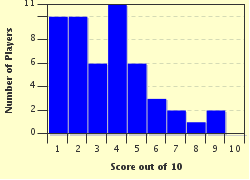Quiz Answer Key and Fun Facts
1. In the infamous Cookie Game of the 1947 World Series, Cookie Lavagetto hit a two-out double in the ninth inning to ruin the no-hitter of which Yankees pitcher?
2. On August 4, 1911, which Washington Senators player infamously stole the bases in the wrong order intentionally?
3. Ty Cobb's brother played in the minor leagues for nine years with various teams including the Kalamazoo White Sox and the Leavenworth Convicts, what was his name?
4. Ice Box Chamberlain was a pitcher who pitched for various teams in the 1880s and 1890s. What was his real name?
5. Who was the only person to pitch a no-hitter in the short-lived Players' League?
6. Who pitched the first perfect game in MLB history?
7. Alfred Jennings played one game for the Milwaukee Grays on August 15, 1878. He was a catcher and had four errors along with 10 passed balls; this horrible defensive performance earned him what nickname?
8. Bob Ferguson was a utility player, manager, and umpire that had the nickname Death to Flying Things. How did he get this moniker?
9. Lewis (whose first name is unknown) pitched three innings for the Buffalo Bisons on July 12, 1890, amassing an ERA of 60.00. He was then swapped for another player, what was this player's name?
10. In 1882 John Montgomery Ward led the National League in saves, how many did he have?
Source: Author
Water_is_wet05
This quiz was reviewed by FunTrivia editor
Fifiona81 before going online.
Any errors found in FunTrivia content are routinely corrected through our feedback system.

